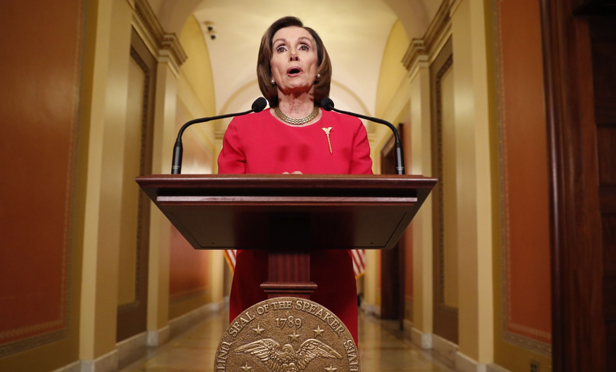 House Speaker Nancy Pelosi. (Photo: Andrew Harnik/AP Photo/Bloomberg)
House Speaker Nancy Pelosi. (Photo: Andrew Harnik/AP Photo/Bloomberg)
The House passed by a voice vote Friday afternoon the Senate's $2.2 trillion relief package, the Coronavirus Aid, Relief, and Economic Security (CARES) Act. Rep. Thomas Massie, R-Ky., requested a recorded vote, but that was denied. The bill now goes to President Donald Trump's desk for his signature.
The package includes an extra $600 a week, for four months, for workers receiving unemployment, a big boost for the healthcare system and direct checks to Americans.
House Speaker Nancy Pelosi, D-Calif., said on the House floor before the vote that "today, we have all acknowledged that our nation faces an economic and health emergency of historic proportions over the coronavirus pandemic, the worst pandemic in over 100 years." She thanked lawmakers on both sides of the aisle for "how seriously we have all taken this important challenge."
The first two bills were about addressing the emergency of the situation, Pelosi said. "This bill today is about mitigation. It doesn't mean we're finished with emergency, but mitigating some of the health and economic" impacts of the coronavirus. "Next we will move to recovery, but always addressing emergency and mitigation needed."
Patrick McHenry, R-N.C., the top Republican on the House Financial Services Committee, said after the vote that the CARES Act, "while not perfect, is the appropriate action to provide necessary resources to get Americans and our economy through this national emergency."
His ultimate goal for the bill, he continued, "is to keep Americans employed. Specifically, this bill will provide relief to our small businesses to help them keep employees on payroll and prepare those businesses to be up and running as soon as America is open for business again."
The relief bill also provides Treasury Secretary Steven Mnuchin and Federal Reserve Board Chairman Jerome Powell "with the resources they need to address the liquidity crisis facing Main Street businesses that employ millions of Americans," McHenry said.
From: ThinkAdvisor
© Touchpoint Markets, All Rights Reserved. Request academic re-use from www.copyright.com. All other uses, submit a request to [email protected]. For more inforrmation visit Asset & Logo Licensing.



